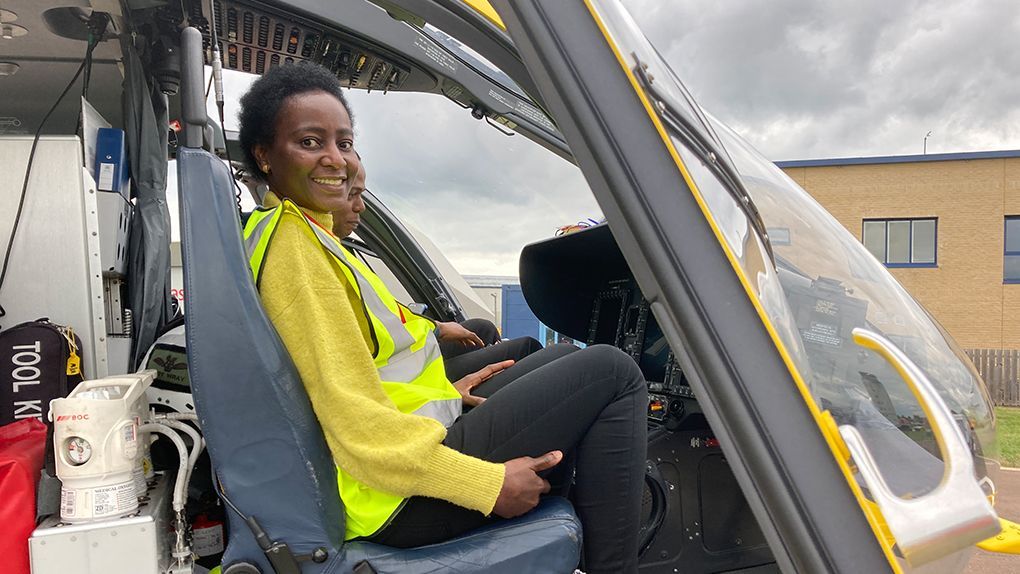Early intervention and quick action saves patient’s life
06 September 2022
Being in the right place at the right time is something that most people take as a simple coincidence, often leading to good fortune. For Tope, being in the right place at the right time ultimately led to her surviving a life-threatening cardiac arrest.
Having been a keen runner for over 20 years, Tope often enjoyed early morning solo runs around 5am. In 2017 Tope’s neighbours introduced her to ParkRun and on this autumnal Saturday morning she decided to go along to her local event.
.jpg)
“I remember it being a rainy and slightly dull day and with the start at 9am, it was later than when I like to run. When I think back now, looking at the situation, normally I wouldn’t have gone as the conditions weren’t right, but Jesus Christ made me go that day.”
Unfortunately, a short distance into the run Tope suffered a life-threatening cardiac arrest and required the services of East of England Ambulance Service Trust (EEAST) and East Anglian Air Ambulance (EAAA).
Having been tasked to the scene by helicopter from the charity’s Cambridge base, Doctor Drew Welch and Critical Care Paramedic Andy Bates knew that early intervention was vital to Tope’s survival.
Watch Tope's story
Warning: includes real footage of the incident.
“Survival from out of hospital cardiac arrests is quite rare and in fact only 8% of people do survive. From our experience we know that it is vital for a patient who has suffered a cardiac arrest to receive early CPR and advanced help.”

Not only were there lots of people who witnessed Tope’s fall and phoned for emergency care, running shortly behind were two doctors who were immediately able to assess the situation and deliver lifesaving CPR. This early intervention almost definitely saved Tope’s life that day.
When the EAAA crew arrived on scene the paramedics from EEAST had already started to treat Tope and managed to achieve ROSC – the Return of Spontaneous Circulation to her heart.
“It was clear that Tope’s condition was extremely serious, she was totally unresponsive which means she had the lowest possible GCS score of just three. The Glasgow Coma Scale is a way of identifying how responsive someone is and Tope was showing no signs of interaction. We needed to quickly build on the work that had already been done to ensure we gave Tope the best chance of survival and recovery.”
Doctor Drew and CCP Andy made the decision to place Tope in an induced coma to allow them to control her breathing and protect her brain. This was an important step in making sure the chances of lasting damage were reduced.
Once stabilised Tope was transferred to hospital for further treatment where she remained in a coma for five days and was unconscious for a total of two weeks. Although the doctors were concerned about brain damage Tope made a miraculous recovery, something she puts down to her faith.
.jpg)
“I had a massive circle of support praying for me, my family, friends, fellow church members, neighbours and of course my husband prayed all the time that I would come through okay and one day, despite what the Doctors thought, I opened my eyes. He was so scared to tell anyone in case I went back to sleep or he was imagining it!”
Spending a total of five weeks in hospital, Tope was fitted with an ICD (internal defibrillator) to shock her heart should another problem occur. Thankfully she has had no further issues. Since the incident it has made Tope and her family even more grateful.
“Something like this wasn’t supposed to happen to someone like me. I’m young and regularly exercise so to have a cardiac arrest was very shocking. To also know that had I have done my usual 5am run, or stayed at home that morning I would have been on my own when it happened and the chances are I would not have survived. Having this experience makes you even more aware and so appreciative of life and I am incredibly thankful for Drew and Andy who gave me every chance of seeing my family again with their critical care interventions. I truly believe God put me there that day to ensure the doctors were behind me to help. It really makes it evident how important knowing how to perform CPR is as this could happen to anyone at any time and if you have those skills you could save someone’s life. ”
Since the incident Tope has been back to Parkrun to thank those that helped her that day and, thanks to EAAA’s Aftercare team, has been to EAAA’s Cambridge base to visit Drew and Andy.